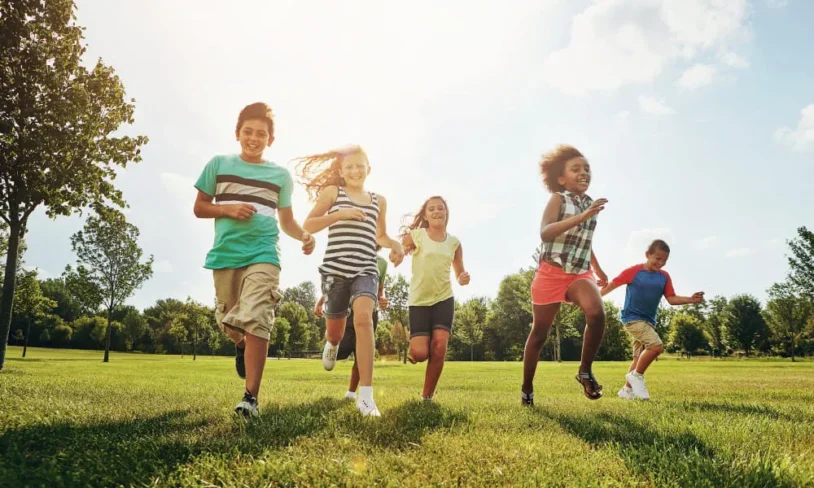Spring is here and it is time to get outside and PLAY!
There is scientific evidence that playing outside improves health, and children of all ages love it.
Nature is all around us.
We don't necessarily need to travel far to enjoy nature. Your family can connect with nature in a school playground, backyard, table-top garden, or even virtually (though not with all of the benefits). There are also many ways to find out what parks are nearby based on zip code, including some that you can get to by walking or taking public transportation. Many public green spaces have features and programs for all ages and abilities.
Read on for ways that you and your children can get a physical and emotional boost from playing outside and spending time in nature.
Playing outside & exploring nature is for all ages
Bringing baby outside. The earlier you share nature with your baby, the more likely they are to develop a life-long love of the outdoors. Even infants and toddlers can play and learn in nature. Take a walk through the trees using a carrier or stroller. Throw down a blanket on the grass or soft earth. Let your baby enjoy the fresh breezes, bird songs, forest smells and plant textures. Give them some outside tummy time, blowing bubbles for them to reach for and watch glisten in the sun.
Explore with preschoolers and younger children. Young children are developing and learning from every experience.
- Build nature sculptures with twigs, leaves, cones, rocks and more by sticking the collected items into a play dough base. Ask your child what kind of patterns they see with the different items. Or, let your child play in mud with old pots, pans, utensils and household tools to develop senses and motor skills.
- Bike or walk with the family in your neighborhood or find a new park to explore. If you have a bicycle trailer or your child is able to bike, get some exercise while enjoying the outdoors. Describe what you see along the way and talk about the weather. Use a lot of details to help them learn new words and engage all their senses.
- Take story time outside. Grab a blanket, some books and find a shady spot to read with your child outdoors. Pick books that talk about nature and help your child make connections.
- Outdoor playdates. Meet up with friends outdoors to build social connections for both children and adults.
Challenge older children & teens. Stay engaged with the outdoors as a family. Take advantage of this time to bond over games and activities you all enjoy or challenge yourselves with something new.
- Hold a nature scavenger hunt or start a nature collection. Look for local plants, trees, animals and birds. Collect rocks, acorns, leaves or pinecones. See how many items children can find on a list or gather objects to add to a collection.
- Leave a trail. Organize with parents of your children's friends to send kids on "secret spy missions." One family goes on a walk with sidewalk chalk, drawing arrows and letters along the way to spell out a secret message. The other family must then follow the arrows along the way to record the letters in the message.
- Have a ball. Kicking a soccer ball, throwing a frisbee, jumping rope or playing any sports you all enjoy can keep the outdoors fun as children get older.
- Pack a picnic or plan a barbeque outside with friends and family. Share a meal, take a walk or play a game together while you enjoy the outdoors.
Healthy benefits of outdoor play
Getting outside provides more than a fun break for children and teenagers. It is also good for their physical and mental health and development. Children and teens who spend time playing outside and enjoying nature can be:
- Physically healthier. Children play harder outdoors than indoors and they need daily opportunities to do so. More outdoor time is linked with improved motor development and lower obesity rates and myopia (nearsightedness) risk. Safely getting some sun also helps us make vitamin D that our bodies need to stay healthy and strong.
- More engaged in learning. Playing outside promotes curiosity, creativity and critical thinking. Studies have found that children who spent more time in nature exploration had improved learning outcomes.
- More positive in behavior. Research shows that when children spent time in natural settings they had less anger and aggression. Impulse control also improves. This might be especially important when normal routines change for children.
- Mentally healthier. Stress and depression are lower for all people who spend time in nature. Children show increased focus and reduced symptoms of Attention Deficit Hyperactivity Disorder.
Remember
Take advantage of the healing power of play in nature—near your home or neighborhood, or wherever you feel comfortable. Remember to dress appropriately for the weather. It's also a good idea to wash hands or use hand sanitizer during and after your adventure.
Finally, ask community leaders to ensure all kids have safe places to play outside. Getting outdoors, being in nature, and moving our bodies is good for everyone!
Source: Healthychildren.org


